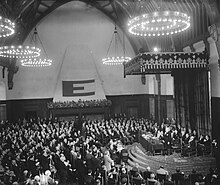Hague European Congress
The Hague European Congress took place in The Hague , Netherlands, from May 7-10, 1948 and is considered by many to be the first federalist movement in European history. The privately initiated conference brought together different groups of the European unity movement. Under the patronage of Winston Churchill , over 700 European activists, mainly from the Union of European Federalists and the United Europe Movement , discussed the political, economic, social and cultural framework conditions of a united Europe. The opening lecture was given by Hendrik Brugmans , President of the Union of European Federalists. A public event with 40,000 participants took place on the fringes of the congress. In addition to the Council of Europe, the European Movement and the Europe of Cultures , the College of Europe is also based on an initiative of the Congress.
Political agenda
The various associations decided to unite to form the European Movement , which was founded at the end of 1948. The final manifesto drawn up in The Hague also sparked the founding of the Council of Europe in 1949.
Attendees
Prominent participants were: Marcel Pilet-Golaz , Winston Churchill , Grégoire Gafenco , Édouard Daladier , Albert-Édouard Janssen , Antony Eden , Juraj Krnjevic , Knut Kristensen , Indalecio Prieto , Hjalmar J. Procopé , Paul Ramadier , Paul Reynaud , Tadeusz Romer , Paul van Zeeland , Jacques Augarde , Gustav Heinemann , Johannes Hoffmann , François Mitterrand , Konrad Adenauer , Léon Chevalme , Alphonse Colle , Maurice Schumann, Auguste Cool, Henri Lambotte, Henri Davezac, Ivo Duchacek, Carl Romme, Gaston Tessier, Zivko Topalovic, Édouard Bonnefous , Georges Chevrot and, Paolo Giobbe; André François-Poncet, Marquess André d'Ormesson, Nicolò Carandini, Étienne Gilson, Charles Morgan, Bertrand Russell, Salvador de Madariaga; Raymond Rifflet, William Rappard , Walter Hallstein , René Capitant, Léon Julliot, Lord Moran, Michel Polonowski, Émile Borel , Gilbert Murray, Peter Fleming , Henry de Ségogne, Jacques Rueff , Maurice Allais, Jan Tinbergen, Harold Butler, Louis Salleron, Jacques Lacour-Gayet, Pierre Hély d'Oissel, Pieter Otten, Adrian Boult, Paul Landowski , Raymond Aron, René Courtin, Walter Layton , Pilsudski, Raymond Silva, Gilberte Brossolette , Frances L. Josephy , Germaine Peyroles , Claire Saunier, Edmond Michelet, Jean de Suzannet, Hugh Delargy, Jean Mathé, Jean Buchmann, Henri Koch, Altiero Spinelli , André Voisin, Robert Bichet, Alexandre Marc , François de Menthon , Luc Durand-Réville, Robert Lemaignen, Edmond Giscard d'Estaing, Henri Cangardel, Georges Le Brun Kéris .
According to nationalities
Germany (West): 51; Austria: 12; Belgium: 68; Bulgaria: 3; Canada: 2; Denmark: 32; Ireland: 5; Spain 7; Finland: 1; France: 155; Greece: 18; United Kingdom: 145; Hungary: 4; Iceland: 1; Italy: 57; Liechtenstein: 3; Luxembourg: 8; Norway: 12; Netherlands: 59; Poland: 5; Portugal: 4; Romania: 5; Vatican: 1; Saarland: 5; Sweden: 19; Switzerland: 40; USA: 4; Czechoslovakia: 10; Turkey: 1; Yugoslavia: 3.
Significance for Germany
Only 3 years after the Second World War, the (West) German participants were involved in a European conference on an equal footing for the first time. Konrad Adenauer and his later important European political comrade Walter Hallstein met for the first time in The Hague. One of the British initiators of the congress, Duncan Sandys , co-founded the German Council of the European Movement in Wiesbaden a year later .
Web links
- Research portal for the Hague Congress at CVCE.eu
- Opening May 7, 1948
- Video (french)
- The original files of the Hague European Congress can be viewed in the EU Historical Archives in Florence
literature
- Winfried Loth: 60 years ago: The Hague European Congress . In: Institute for European Politics (ed.): Integration . No. 31 . Nomos, Baden-Baden 2008, p. 179–190 ( nomos-elibrary.de ).
Individual evidence
- ^ Klaus Brummer : The Council of Europe. An introduction . VS, Verlag für Sozialwissenschaften, Wiesbaden 2008, ISBN 978-3-531-15710-8 , p. 22.
- ^ History. College of Europe, accessed March 27, 2012 . (English France)
